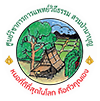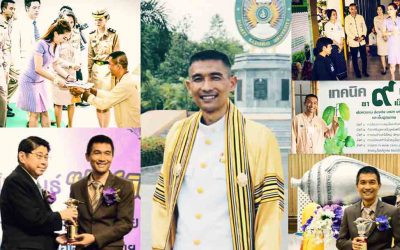ศึกษาวิเคราะห์การพัฒนาคุณภาพชีวิตเชิงพุทธของชุมชนภูผาฟ้าน้ำ อ.แม่แตง จ.เชียงใหม
นาย จรัญ บุญมี
วิทยานิพนธ์นี้เป็นส่วนหนึ่งของการศึกษา
ตามหลักสูตรปริญญาพุทธศาสตรมหาบัณฑิต
สาขาวิชาพระพุทธศาสนา
มหาวิทยาลัยมหาจุฬาลงกรณราชวิทยาลัย
พุทธศักราช ๒๕๖๖
(ลิขสิทธิ์เป็นของมหาวิทยาลัยมหาจุฬาลงกรณราชวิทยาลัย)
- ชื่อวิทยานิพนธ์ : ศึกษาวิเคราะห์การพัฒนาคุณภาพชีวิตเชิงพุทธของชุมชนภูผาฟ้าน้ำ อ.แม่แตง จ.เชียงใหม่
- ผู้วิจัย : นายจรัญ บุญมี
- ปริญญา : พุทธศาสตรดุษฎีบัณฑิต (พระพุทธศาสนา)
- คณะกรรมการควบคุมวิทยานิพนธ์ :
- พระครูปริยัติเจติยานุรักษ์, ผศ. ดร., ป.ธ. ๔, พธ.บ. (พุทธจิตวิทยา), พธ.ม. (พระพุทธศาสนา), พธ.ด. (พระพุทธศาสนา)
- รศ. ดร.พูนชัย ปันธิยะ, พธ.บ. (พระพุทธศาสนา), ศศ.ม. (ปรัชญา), Ph.D. (Buddhist Studies)
- วันเสร็จสมบูรณ์ : ๒๑ มิถุนายน ๒๕๖๖
บทคัดย่อ
วิทยานิพนธ์นี้มีวัตถุประสงค์ ๑) เพื่อศึกษาการพัฒนาคุณภาพชีวิตในพระพุทธศาสนาเถรวาท ๒) เพื่อศึกษาการพัฒนาคุณภาพชีวิตของชุมชนภูผาฟ้าน้ำ อ.แม่แตง จ.เชียงใหม่ ๓) เพื่อศึกษาวิเคราะห์การพัฒนาคุณภาพชีวิตเชิงพุทธของชุมชนภูผาฟ้าน้ำ อ.แม่แตง จ.เชียงใหม่ เป็นการวิจัยเชิงคุณภาพภาคสนาม ผลการศึกษา พบว่า
การพัฒนาคุณภาพชีวิตในพระพุทธศาสนาเถรวาท ด้วยหลักภาวนา ๔ คือ กายภาวนา คือการพัฒนาอินทรีย์ ๕ ศีลภาวนา คือพัฒนาความประพฤติ จิตภาวนา คือพัฒนาจิตและปัญญาภาวนา คือพัฒนาปัญญา เมื่อได้พัฒนากาย ศีล จิต ปัญญาตามหลักพระพุทธศาสนาแล้วทำให้มีคุณภาพชีวิตที่ดี ๔ ด้าน เรียกว่าภาวิต ๔ คือภาวิตกาย มีกายอันสงบเรียบร้อย ภาวิตศีล มีความประพฤติที่ถูกต้องดีงาม ภาวิตจิต มีจิตใจเข้มแข็งไม่หวั่นไหวต่อกิเลสตัณหา ภาวิตปัญญา มีปัญญาวิมุตติ สูงสุดคือหลุดพ้นจากความทุกข์ทั้งปวง
การพัฒนาคุณภาพชีวิตของชุมชนภูผาฟ้าน้ำ ชุมชนภูผาฟ้าน้ำมีการพัฒนาคุณภาพชีวิต เพื่อก่อให้เกิดความผาสุกแห่งตนและผู้อื่นถึงพร้อม โดยมีวิธีการขัดเกลากิเลสอันเป็นเหตุแห่งทุกข์ จึงนำพัฒนาด้วยหลักการแก้ทุกปัญหา ๕ ประการ ๑) คบและเคารพมิตรดี ๒) มีอริยศีล ๓) ทำสมดุล ๔) พึ่งตน ๕) แบ่งปันด้วยใจบริสุทธิ์ มาประยุกต์ใช้ในชุมชนภูผาฟ้าน้ำ สำเร็จผลเป็นคุณภาพชีวิตของชุมชนภูผาฟ้าน้ำ ๔ ประการ คือ ๑) ชีวิตพอเพียงเรียบง่าย ๒) ร่างกายแข็งแรง ๓) จิตใจดีงาม ๔) ปัญญาผาสุก
วิเคราะห์การพัฒนาคุณภาพชีวิตเชิงพุทธของชุมชนภูผาฟ้าน้ำ พบว่า ดร.ใจเพชร กล้าจน ผู้นำชาวชุมชนภูผาฟ้าน้ำได้วางหลักการพัฒนาคุณภาพชีวิต ๔ ประการ คือ ๑) ชีวิตพอเพียงเรียบง่าย ๒) ร่างกายแข็งแรง ๓) จิตใจดีงาม ๔) ปัญญาผาสุก เป็นคุณภาพชีวิตเชิงพุทธบูรณาการ ดังนี้ ๑) ภาวิตกาย เป็นคุณภาพชีวิต ด้านร่างกายแข็งแรง ๒) ภาวิตศีล เป็นคุณภาพชีวิต ด้านชีวิตพอเพียงเรียบง่าย ๓) ภาวิตจิต เป็นคุณภาพชีวิตด้าน จิตใจดีงาม ๔) ภาวิตปัญญา เป็นคุณภาพชีวิตด้าน ปัญญาผาสุก การพัฒนาคุณภาพชีวิตของชุมชนภูผาฟ้าน้ำ เป็นการนำหลักพุทธศาสนามาใช้จึงเป็นการพัฒนาคุณภาพชีวิตเชิงพุทธ เป็นคุณภาพชีวิตที่ดีงามของชุมชน
Analyical studdy of Buddhist Life Quality Development in Phu Pha Fah Nam Community, Mae Taeng District, Chiang Mai Province
Mr. Charun Bunmee
A Thesis Submitted in Partial Fulfillment of
the Requirements for the Degree of
Master of Arts
(Buddhist Studies)
Graduate School
Mahachulalongkornrajavidyalaya University
C.E. 2023
(Copyright by Mahachulalongkornrajavidyalaya University)
- Researcher : Mr. Charun Bunmee
- Degree : Master of Arts (Buddhist Studies)
- Thesis Supervisory Committee :
- Phrakrupariyathijethiyanuruksa, Asst. Prof. Dr., Pali IV, B.A. (BuddhistPsychology), M.A. (Buddhist Studies),
Ph.D. (Buddhist Studies) - Assoc. Prof. Dr. Phoonchai Punthiya, B.A. (Religions), M.A. (Philosophy), Ph.D. (Buddhist Studies)
- Phrakrupariyathijethiyanuruksa, Asst. Prof. Dr., Pali IV, B.A. (BuddhistPsychology), M.A. (Buddhist Studies),
- Thesis Title : Analyical studdy of Buddhist Life Quality Development in Phu Pha Fah Nam Community, Mae Taeng District Chiang Mai Province
- Date of Completion : June 21, 2023
ABSTRACT
This thesis aims to examine the progress of quality of life within the context of Theravada Buddhism, as well as the development of quality of life specifically in the Phu Pha Fah Nam Community situated in Mae Taeng District, Chiang Mai Province. The research approach employed for this study is qualitative and involves conducting field research.
The findings of the study indicate that the enhancement of quality of life within Theravada Buddhism is rooted in various aspects of development, namely Bhàvanà (mental cultivation), Kàya-bhàvanà (physical development), Indriya (controlling faculties), Sãlabhàvanà (moral development), Citta-bhàvanà (cultivation of the mind), and Pannà-bhàvanà (cultivation of wisdom). Through adherence to these principles, individuals have been able to foster positive quality of life in four key domains known as Bhavit 4: Bhavikaya (attainment of a tranquil body), Bhavitsila (adoption of virtuous conduct), Bhavitcitta (cultivation of a resilient mind immune to defilements), and Bhavitpanna (supreme wisdom leading to liberation from suffering).
The Phu Pha Fah Nam community has made significant strides in enhancing the quality of life, aiming to promote well-being for both oneself and others. To alleviate the root cause of suffering, they have embraced a path of purifying passions. The community has embraced five guiding principles as a means to address various challenges: 1) fostering associations and showing respect to virtuous companions, 2) upholding noble precepts, 3) seeking balance, 4) cultivating self-reliance, and 5) engaging in benevolent sharing with a pure heart. These principles have been applied within the Phu Pha Fah Nam community, resulting in a remarkable improvement in their quality of life across four key aspects: 1) leading a life of simplicity and sufficiency, 2) cultivating physical strength, 3) nurturing a wholesome mind, and 4) cultivating wisdom and experiencing genuine happiness.
Through an analysis of the development of Buddhist quality of life within the Phu Pha Fah Nam community, it was discovered that Dr. Jaipetch Klajon, the community leader, established four essential principles to enhance their overall well-being. These principles encompass: 1) embracing a life of simplicity and sufficiency, 2) cultivating physical strength, 3) fostering a virtuous heart, and 4) embodying Panyaphasuk (wisdom leads to happiness), an integrated Buddhist quality of life. Panyaphasuk comprises the following elements: 1) Bhavitkaya, which pertains to the quality of life concerning physical strength, 2) Bhavitsila, which refers to the quality of life derived from a simple sufficiency lifestyle, 3) Bhavitcitta, which encompasses the quality of life resulting from a virtuous mind, and 4) Bhavitpanna, which represents the quality of life attained through wisdom. By implementing these Buddhist principles, the Phu Pha Fah Nam community has successfully improved their quality of life, aligning it with the teachings of Buddhism and fostering a positive quality of life for the entire community.
.
วิธีใช้ Embed PDF
- กรุณากดลูกศร ซ้าย-ขวา ในการเปลี่ยนหน้า
- ถ้าหากตัวอักษรเล็ก-ใหญ่เกินไป กรุณากดเครื่องหมาย บวก-ลบ เพื่อปรับขยาย-ลดตัวอักษร
ประวัติผู้วิจัย
| ชื่อ –สกุล | นายจรัญ บุญมี |
| วัน เดือน ปี เกิด | ๒๑ สิงหาคม ๒๕๑๖ |
| ที่อยู่ปัจจุบัน | ๓๑/๑ หมู่ ๕ ชุมชนภูผาฟ้าน้ำ บ้านแม่เลา ต.ป่าแป๋ อ.แม่แตง จ.เชียงใหม่ |
| ประสบการณ์การทำงาน | วิทยากรสุขภาพแพทย์ทางเลือกแพทย์วิถีธรรม กรมการแพทย์ทางเลือกงานช่างโยธา |
| ผลงานทางวิชาการ | ปรัชญาพุทธศาสนานิกายเซน อิทธิพลสู่ยุคปัจจุบัน มหาวิทยาลัยมหาจุฬาลงกรณราชวิทยาลัย วิทยาเขตเชียงใหม่ |
| ปีที่เข้าศึกษา | ปีการศึกษา ๒๕๖๔ |
| ปีที่สำเร็จการศึกษา | ปีการศึกษา ๒๕๖๖ |
| ประวัติการศึกษา | ปริญญาตรี หลักสูตรศิลปศาสตรบัณฑิต สถาบันอาศรมศิลป์ |


